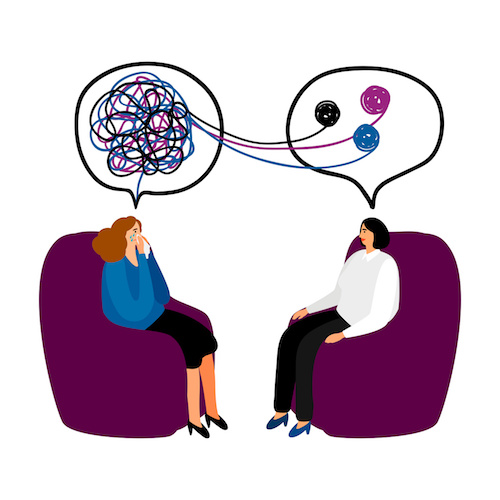The Importance of Mental Wellness: a Deep Study Therapy, Therapy, and Their Benefits
Psychological wellness significantly shapes individual wellness, influencing emotions, thoughts, and behaviors. Therapy and treatment function as vital methods for recovery and individual growth. They provide organized assistance, aiding individuals browse life's obstacles. Numerous remain uninformed of the particular types of therapy readily available and their unique benefits. Comprehending these aspects is necessary for any person thinking about expert psychological health and wellness assistance. What complies with may brighten courses to strength and fulfillment that numerous ignore.
Comprehending Mental Wellness and Its Influence
Although mental health is usually overlooked, it plays a vital role in overall well-being and everyday functioning. It encompasses psychological, emotional, and social factors that influence just how individuals believe, really feel, and behave. An individual's mental wellness straight impacts their capacity to take care of stress, associate with others, and choose. Poor psychological health and wellness can bring about different issues, consisting of anxiety, anxiety, and trouble in preserving partnerships, every one of which can prevent professional and personal growth.Furthermore, psychological health has significant ramifications for physical health. Persistent tension and untreated mental problems can contribute to various physical conditions, such as heart illness and compromised immune actions. Alternatively, favorable psychological wellness promotes durability, allowing people to manage life's obstacles properly. Understanding mental wellness's relevance is essential for fostering encouraging settings that advertise emotional wellness, thus enhancing the quality of life for neighborhoods and people alike
The Various Kinds Of Therapy and Treatment
In the domain name of psychological wellness, numerous therapy and treatment types accommodate varied requirements. Private therapy strategies concentrate on individual concerns through one-on-one sessions, while team therapy dynamics foster shared experiences and support among participants. Understanding these modalities is vital for picking the suitable intervention for different challenges.
Private Therapy Approaches
Numerous specific counseling methods exist, each developed to resolve certain psychological health and wellness issues and deal with differing customer needs. Cognitive Behavior Treatment (CBT) concentrates on determining and altering negative idea patterns, while Psychodynamic Therapy explores unconscious processes and past experiences. Humanistic Therapy highlights individual growth and self-actualization, promoting an encouraging setting. Interpersonal Therapy (IPT) targets connection issues and communication patterns to enhance psychological health. In addition, Approval and Dedication Therapy (ACT) motivates clients to accept their ideas and feelings while dedicating to personal worths. Each strategy uses distinct techniques and philosophies, permitting experts to customize their approaches to the person, consequently boosting the restorative experience and promoting mental health recuperation.
Team Treatment Characteristics
Team therapy characteristics include numerous healing strategies that leverage the power of common experiences and social partnerships. This type of therapy commonly includes diverse groups, fostering a safe setting for individuals to express feelings and thoughts. Key types of team therapy include support system, which offer emotional support; process-oriented teams, concentrating on interpersonal interactions; and psychoeducational groups, targeted at presenting expertise about psychological wellness problems. The characteristics within these teams can improve self-awareness, as members typically mirror on their behaviors in regard to others. In addition, team treatment cultivates a feeling of belonging, reducing sensations of seclusion. Through shared stories and cumulative analytic, participants can create dealing approaches and get understandings, ultimately adding to specific development and healing.
The Duty of Counseling in Mental Health
Counseling plays a necessary function in mental health by using numerous methods customized to individual demands. These methods provide professional guidance that can bring about considerable enhancements in emotional health. Comprehending the different kinds of counseling can aid individuals make informed choices concerning their psychological healthcare.

Types of Therapy Methods
While various counseling strategies exist, each deals special techniques and insights right into mental health treatment - Couples Therapy. Amongst one of the most popular are cognitive-behavioral therapy (CBT), which concentrates on modifying adverse thought patterns; psychodynamic treatment, which discovers unconscious processes and childhood experiences; and humanistic methods, emphasizing personal development and self-actualization. In addition, solution-focused quick therapy prioritizes finding services in today as opposed to delving into problems. Team treatment cultivates community and shared experiences, while family therapy addresses relational dynamics within domestic frameworks. Each method deals with different requirements, straightening with individual preferences, concerns, and healing objectives. Recognizing these techniques aids customers make notified selections concerning their psychological health trip and advertises efficient therapy customized to their distinct circumstances
Advantages of Professional Guidance
Numerous individuals benefit from specialist advice in handling their psychological health and wellness difficulties. Counseling provides a safe space for customers to discover their thoughts and feelings without judgment. This therapeutic atmosphere fosters self-awareness, permitting individuals to determine patterns in their habits and establish much healthier coping techniques. Expert guidance additionally provides access to evidence-based strategies that can reduce signs and symptoms of anxiousness, clinical depression, and various other psychological wellness concerns. Therapists can assist in setting reasonable objectives and supply support in accomplishing them, enhancing overall health. The collective relationship between therapist and client is essential, as it promotes responsibility and encourages individual growth. Ultimately, expert advice plays an essential duty in steering mental wellness trips, resulting in enhanced psychological resilience and life complete satisfaction.
Benefits of Treatment: Healing and Growth

How to Choose the Right Specialist or Therapist
How can one browse the commonly frustrating process of selecting the best specialist or therapist? Identifying personal requirements is important; people should consider their specific concerns, whether clinical depression, stress and anxiety, or connection obstacles. It is valuable to study different restorative approaches, such as cognitive-behavioral therapy or psychodynamic treatment, to find a suitable match.Next, possible customers ought to look for recommendations from trusted resources or use on the internet directory sites. It is crucial to assess specialists' credentials, including their education and learning, licensing, and locations of expertise. Setting up initial assessments can assist determine compatibility, permitting individuals to evaluate communication styles and personal comfort.Finally, logistical factors, such as location, schedule, and fees, need to additionally be taken into consideration. By thoughtfully weighing these aspects, one can make a notified decision, ultimately fostering a restorative partnership that supports psychological wellness and personal development.
Conquering Preconception: Accepting Mental Health And Wellness Assistance
While societal attitudes towards mental health and wellness have actually evolved, preconception still presents a substantial obstacle for several seeking assistance. This preconception usually manifests as mistaken beliefs bordering psychological health problem, leading people to feel shame or worry concerning their struggles. Lots of people wait to seek therapy or therapy due to fears about being judged or identified. Conquering this stigma is fundamental for cultivating an encouraging setting where people can honestly discuss visit this site right here their mental health needs.Communities and companies play an essential duty in this change by promoting recognition and education and learning concerning mental health and wellness issues. Efforts that highlight personal stories can humanize these experiences, encouraging others to look for assistance without worry. As approval expands, people might really feel much more empowered to accept psychological wellness assistance, identifying it as a necessary element of overall wellness. By taking down stigma, society can grow a culture of understanding, empathy, and positive psychological health and wellness treatment.
Techniques for Keeping Psychological Health Outside of Treatment
Therapy gives beneficial support, preserving psychological health outside of sessions is equally crucial. People can apply several methods to sustain their psychological wellness. Normal exercise plays a crucial duty, as exercise promotes the release of endorphins, which improve mood. In addition, a well balanced diet regimen abundant in nutrients can significantly influence psychological security and energy levels.Practicing mindfulness and reflection assists individuals take care of stress and develop higher self-awareness. Establishing a consistent sleep routine is likewise basic, as quality rest is important for cognitive feature and psychological regulation.Engaging in social tasks promotes link and reduces feelings of seclusion. Going after passions or hobbies can offer an innovative electrical outlet and increase self-worth. Lastly, practicing and setting reasonable goals self-compassion permits people to grow More about the author resilience. By integrating these approaches into daily life, individuals can effectively sustain their mental well-being past treatment sessions.
Often Asked Concerns

How Can I Inform if I Need Therapy?

Identifying the need for therapy usually includes acknowledging relentless feelings of despair, anxiousness, or frustrating stress and anxiety. If day-to-day functioning becomes challenging or coping systems fall short, seeking specialist support may be a helpful progression.
What Should I Anticipate in My First Therapy Session?
In the first therapy session, people can anticipate an introduction, discussion of their factors for looking for aid, and a summary of the therapist's technique, developing a foundation for future conversations and establishing comfort in the therapeutic room.
Are Online Therapy Procedure as Effective as In-Person Ones?
Study suggests that online therapy sessions can be as efficient as in-person ones. Factors such as the specialist's certifications, customer interaction, and the therapeutic connection greatly influence end results, no matter the tool used.
Can Treatment Assist With Relationship Issues?
Therapy can help individuals in attending to partnership issues by providing tools for interaction, understanding emotions, and solving conflicts. Couples Therapy. It advertises healthier dynamics and motivates personal growth, eventually fostering stronger, more satisfying links between partners
For How Long Does Therapy Commonly Last?
Treatment duration differs significantly based on private needs and goals. Generally, sessions may last from a few weeks to numerous months, with some people taking part in recurring therapy to deal with long-term concerns and individual growth. Cognitive Behavior Therapy (CBT) focuses on identifying and transforming negative idea patterns, while Psychodynamic Therapy checks out unconscious processes and past experiences. Trick kinds of team treatment navigate to this website consist of assistance groups, which provide emotional assistance; process-oriented groups, concentrating on interpersonal communications; and psychoeducational groups, intended at presenting expertise concerning mental wellness issues. Among the most popular are cognitive-behavioral therapy (CBT), which concentrates on modifying adverse idea patterns; psychodynamic therapy, which checks out unconscious processes and childhood experiences; and humanistic methods, emphasizing individual development and self-actualization. Group treatment cultivates neighborhood and shared experiences, while family therapy addresses relational dynamics within familial structures. It is beneficial to research various restorative approaches, such as cognitive-behavioral therapy or psychodynamic therapy, to locate an appropriate match.Next, prospective clients ought to seek recommendations from relied on sources or use on-line directory sites.